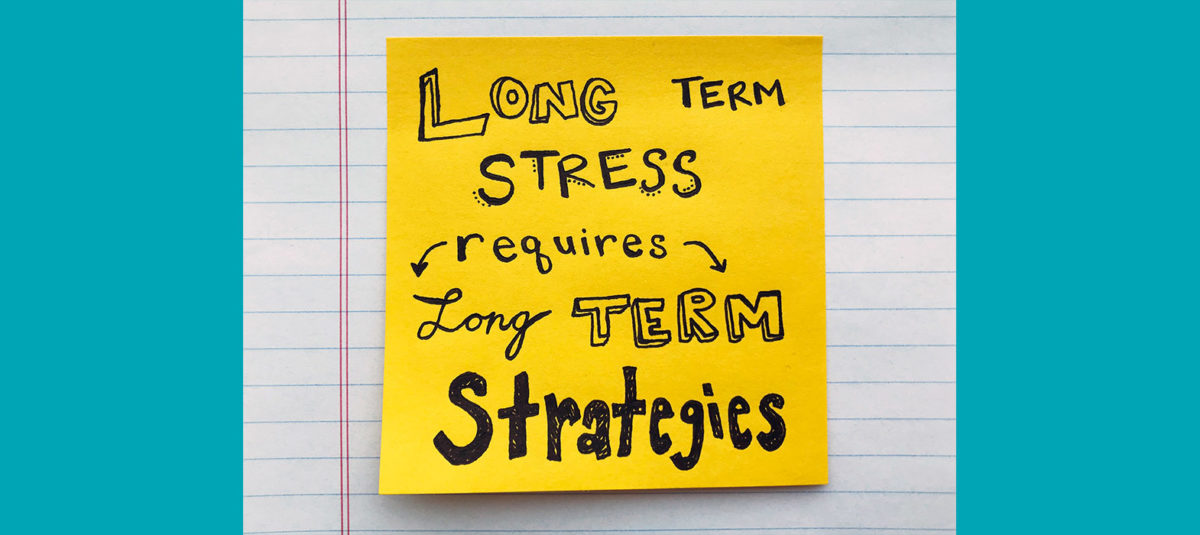Each spring during Stress Less Week, we focus a great deal on the most present stressors in students’ lives: final exams. This means we also focus on the most immediate methods for dialing back that stress such as taking a walk or yoga class, listening to a comedy podcast, or moderating caffeine intake so that much-needed sleep is also possible.
These are necessary reminders at such a stressful time of the year, but what about the other stressors we feel throughout the year that only seem to get more intense at this time? As some students decide whether to sacrifice income over the summer to take a great internship, contemplate graduating and the big transition ahead of them, and agonize over the debt they’ve accrued to get a degree that might not get them a job that will adequately pay it off, let’s turn to long-term stress management strategies.
See a Campus Counselor
Whether you’ve felt the need to see a campus counselor yet or not, the end of the year is a great time to go in for a session or two if you can. Why? Well, whether you’re graduating or not, spring and summer can be a time of transition and expectation. How will you find opportunities to fill out your résumé? How will you prepare to pay for the next semester or year of rent? How will you find your first job in your chosen field?
A counselor can help you find strategies to answer these questions and keep your stress level in a normal range while you embark on a new phase of your journey.
Keep a Budget
Keeping a budget can seem like a scary proposition, and for the one-third of college students who don’t know where their next meal is coming from, the concept might be downright laughable. However, writing down all of your financials in a spreadsheet or app has one benefit to anyone: it can help you feel in control of what you have and what you need, even when you don’t have control. That sense of psychological control can often make a huge difference in your motivation to press on.
Speaking of need, if you or anyone you know is one of the 36% of students living with food or housing insecurity, you can call 2-1-1 nearly anywhere in the United States to get connected to social services that provide food, shelter, and other supplies to people in need.
Schedule Time for Sleep and Fun
This might sound bizarre, but as someone who has done this for herself, hear me out. If you’re working an internship to fill out your résumé, taking a summer class to graduate on time, or working as much as possible in order to pay off your student loans (or all of the above), it can be hard to justify time just for you. However, if you’re going to keep that kind of pace, you’re going to need energy, a support system, and a little mindfulness on your side.
Schedule time into your calendar when you need some extra sleep, or time with family and friends, or 10 minutes to meditate. If it’s in your calendar, you have to do it, right?
Keep a List of Everyday Things that Heal You
Whether it’s listening to music or a podcast, taking a bubble bath, going for a run, cooking dinner with a friend, or spending some time meditating, having a list of things you can do to feel less stressed and more optimistic is essential to staving off overwhelm. Keep the list on your phone or somewhere you can access it regularly so that when you feel your breathing get shallower and your body tense up, you can refer to the list of things that help you relax and get perspective.
Keep a List of Therapists on Hand
Whether you’ve been to see a therapist or not, if you’re graduating and going out into the world it’s only going to get harder to motivate yourself to talk to someone if you cross the line from stress to anxiety and need help coming. So, make a list of therapists in your area you could see if you need them.
Stay Active
This reminder works on two levels. As many of us know, physical activity can play a very effective role in reducing stress. Whether you choose yoga, walking, running, a local team sport, or classes at a local gym, the biological and psychological effects of physical activity are well-documented.
You should also consider staying active in your community. No matter what your belief, talent, or cause, committing to a local community organization can be energizing, meaningful, and it can even introduce you to a new community of people with similar values and interests. If you have a passion, consider going to find the tribe of people who share it. Back in 2009, I found that tribe in Active Minds. I hope you can find yours, too.




